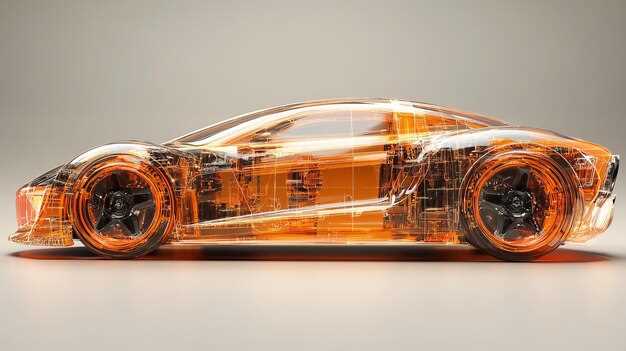
The automotive industry is undergoing a transformative shift, with hydrogen cars emerging as a pivotal force in redefining traditional vehicle design. Innovation driven by sustainability has led manufacturers to explore alternative fuel sources, prompting a re-evaluation of performance metrics in sports car development. As environmental concerns take precedence, the integration of hydrogen technology is influencing not only the mechanics of these vehicles but also their aesthetic and functional aspects.
Sports cars, historically defined by their powerful combustion engines and sleek designs, are now being reimagined through the lens of innovation offered by hydrogen fuel cells. This shift has started to resonate through design trends, as manufacturers look to balance aesthetics and performance with eco-friendliness. The implications of hydrogen-powered vehicles extend beyond mere fuel consumption; they challenge the established norms, urging designers to innovate without compromising speed and luxury, key tenets of the sports car category.
Additionally, the melding of hydrogen technology with sports car design presents unique challenges and opportunities. Engineers and designers are tasked with creating vehicles that not only meet the growing demand for zero-emission cars but also excite enthusiasts with cutting-edge style and remarkable capabilities. As we delve deeper into the impact of hydrogen cars, it becomes clear that this technological wave is redefining the essence of sports car culture, paving the way for a future where innovation and sustainability coalesce in a dynamic automotive landscape.
Advancements in Hydrogen Fuel Cell Technology for Performance Vehicles

Recent innovations in hydrogen fuel cell technology have significantly influenced the design and performance of cars, particularly in the sports segment. The efficiency of modern fuel cells has improved dramatically, allowing for quicker energy conversion and reduced weight. Advanced materials, such as lightweight composites and more effective catalysts, have been developed to enhance performance while maintaining the structural integrity of the vehicle.
One of the key advancements is the increase in hydrogen storage capabilities. Innovations in high-pressure tanks and solid-state hydrogen storage solutions have made it possible to store more hydrogen in a smaller space, thus extending the range of performance vehicles. This is critical for sports cars, where performance and agility are paramount.
Additionally, the integration of hydrogen fuel cells with electric powertrains has opened new avenues for performance optimization. These hybrid systems can provide instantaneous torque delivery, resulting in rapid acceleration and enhanced driving dynamics, a hallmark of any high-performing sports car. This synergy of technologies showcases the potential for hydrogen cars to compete with traditional combustion engines and battery-electric vehicles in terms of speed and thrill.
The development of scalable fuel cell systems has also contributed to the versatility of hydrogen-powered vehicles. Manufacturers can tailor systems to different performance needs, allowing for customization specific to sports car design. This flexibility encourages innovation in engine design, weight distribution, and aerodynamics, leading to even more refined driving experiences.
Furthermore, the growing infrastructure for hydrogen refueling stations is facilitating the practical use of hydrogen cars in everyday scenarios, appealing to sports car enthusiasts looking for sustainability without sacrificing performance. As these advancements continue, the future of sports car design will increasingly embrace hydrogen technology, merging eco-friendliness with exhilarating driving dynamics.
Design Innovations in Aerodynamics and Lightweight Materials in Hydrogen Sports Cars
The emergence of hydrogen cars has significantly influenced the design principles of sports vehicles, particularly in the areas of aerodynamics and material selection. With the goal of maximizing efficiency and performance, manufacturers are leveraging advanced aerodynamic designs that reduce drag and improve stability at high speeds. These innovations include streamlined body shapes, active aerodynamic components, and innovative airflow management systems that optimize downforce while minimizing air resistance.
Lightweight materials play a crucial role in the development of hydrogen sports cars. By utilizing materials such as carbon fiber, aluminum alloys, and high-strength plastics, manufacturers can significantly reduce vehicle weight. This reduction not only enhances acceleration and handling but also contributes to improved hydrogen efficiency, allowing for longer ranges and better overall performance. The emphasis on lightweight construction supports the high-speed capabilities of sports cars while accommodating the additional weight of hydrogen fuel systems.
To further enhance aerodynamic performance, hydrogen sports cars often incorporate features such as retractable spoilers and adjustable air intakes, which adapt to real-time driving conditions. These design strategies work in conjunction with lightweight architecture to create vehicles that are not only fast but responsive and engaging to drive. The integration of advanced computational fluid dynamics tools in the design process allows engineers to simulate and refine aerodynamic performance before the physical prototypes are built, ensuring each model maximizes its potential on the road.
In conclusion, the design innovations in aerodynamics and lightweight materials are essential to the evolution of hydrogen sports cars. These advancements facilitate better performance, efficiency, and sustainability, marking a transformative shift in the automotive landscape as hydrogen technology continues to gain traction in the sports car segment.
Market Influence of Hydrogen Sports Cars on Consumer Preferences and Brand Strategies

The advent of hydrogen sports cars is reshaping consumer preferences within the automotive market. As awareness of environmental issues grows, consumers are increasingly drawn to vehicles that offer sustainability alongside performance. Hydrogen-powered sports cars provide a unique proposition, combining eco-friendliness with the exhilaration that enthusiasts expect from high-performance vehicles.
This shift in consumer sentiment is prompting automotive brands to reevaluate their strategies. Traditional manufacturers are beginning to invest in hydrogen technology, recognizing that differentiation is crucial in a competitive landscape. Brands that once focused solely on gasoline engines are now exploring hydrogen as a viable alternative, aiming to attract environmentally conscious buyers while maintaining their performance legacy.
Moreover, the perception of hydrogen sports cars as high-tech and innovative influences consumer buying decisions. Enthusiasts seek not only speed and agility but also vehicles that align with progressive values. This alignment drives brands to enhance their marketing strategies, emphasizing cutting-edge technology and the sustainability of hydrogen energy in their promotional campaigns.
In summary, hydrogen sports cars are significantly impacting market dynamics, encouraging brands to adapt their product offerings and marketing approaches. As consumer preferences evolve towards greener options, the automotive industry is likely to witness a surge in hydrogen technology integration, reshaping the future of sports car design and performance.



